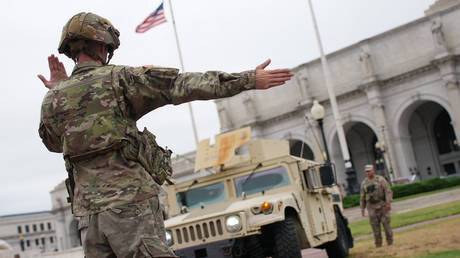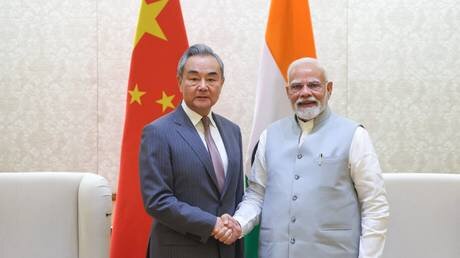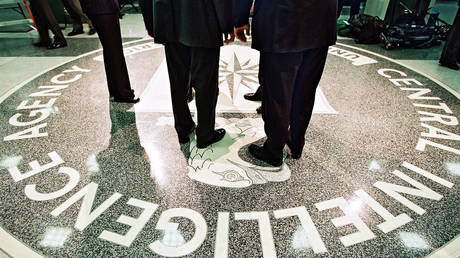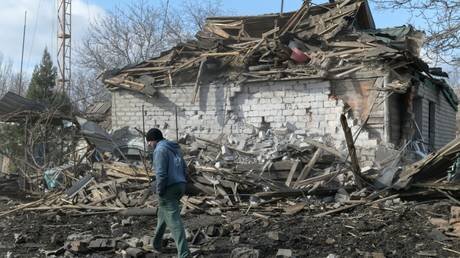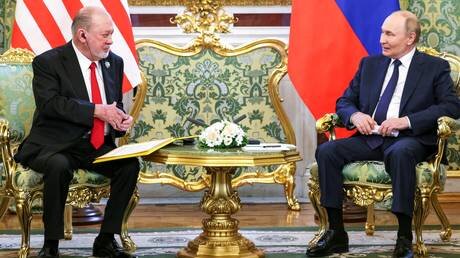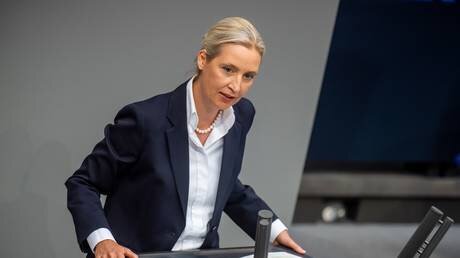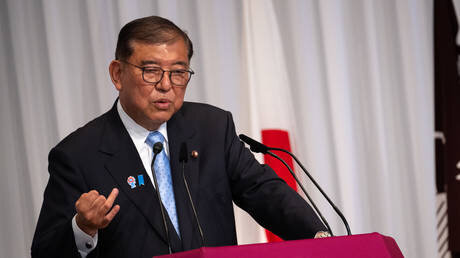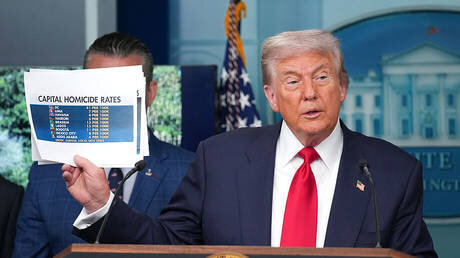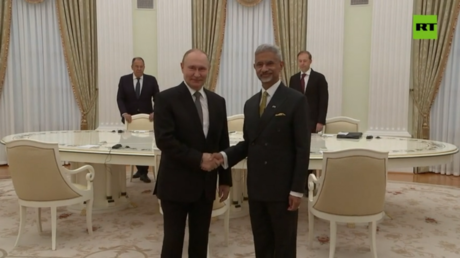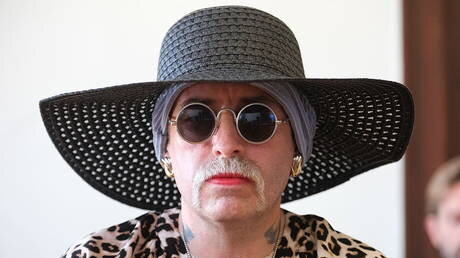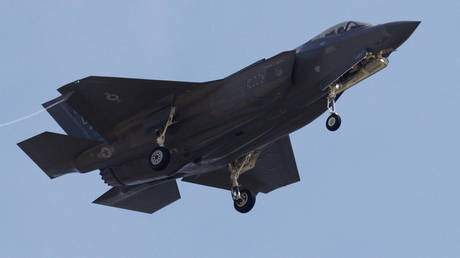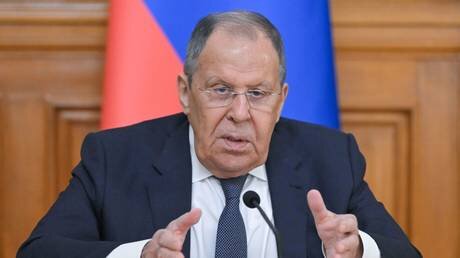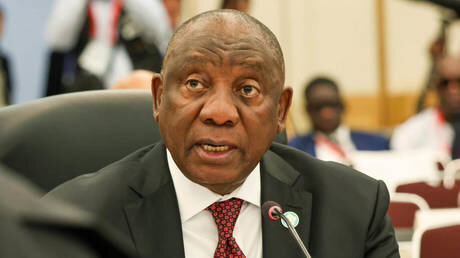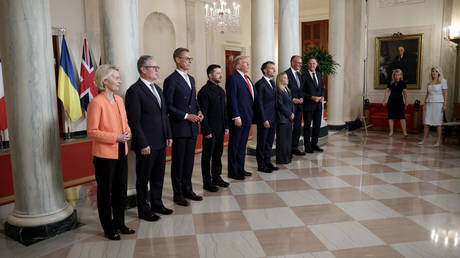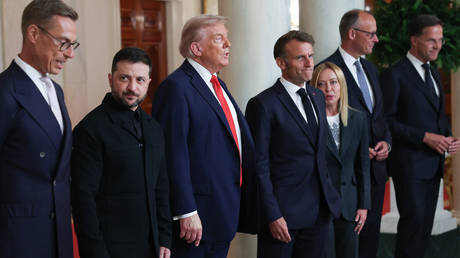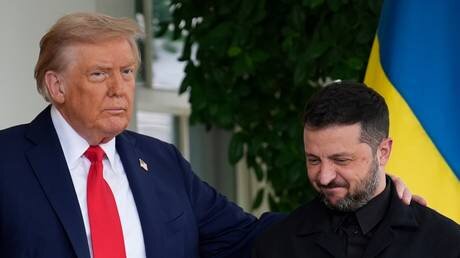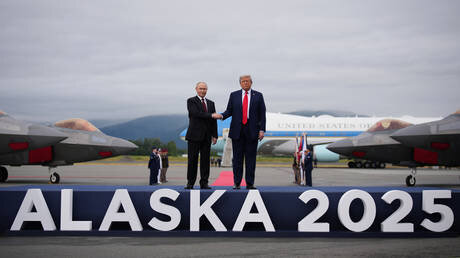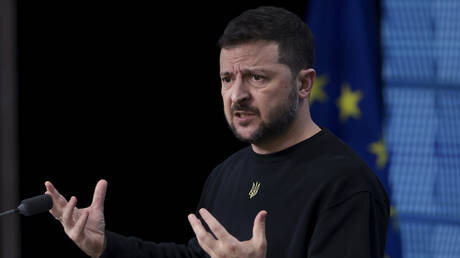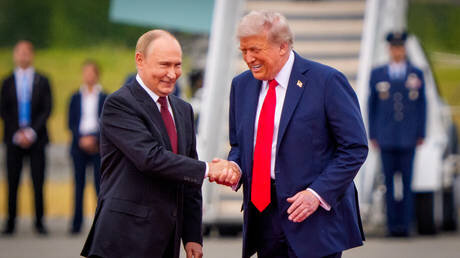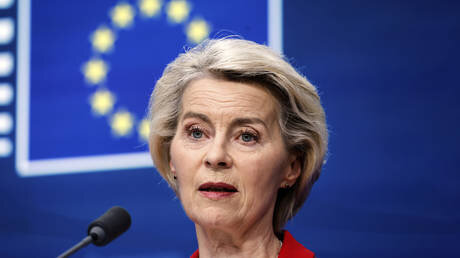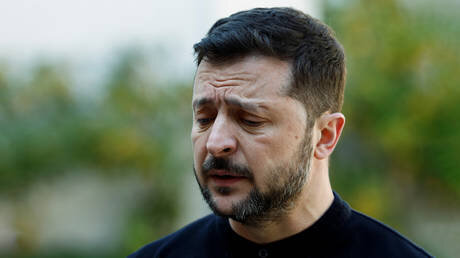
Everything posted by American Women Suck
-
US in talks over Ukraine security role – media
Russia has said any Western troop deployment to the neighboring country would be “unacceptable” Senior US and European officials have discussed options for potential security guarantees for Ukraine, including the idea that Washington could command a group of forces despite not providing its own troops, several media outlets have reported. According to Reuters, the chiefs of defense from the US, Finland, France, Germany, Italy, the UK, and Ukraine met in Washington from Tuesday to Thursday to present options to their national security advisers. A source told the agency that US Secretary of State and Marco Rubio also held a conference call with his European counterparts on Thursday to review the proposals. While the final details have not been decided, European nations would be expected to contribute “the lion’s share” of any forces involved, Reuters reported. A source told the agency that the US is still “determining the scope of its role,” and that one option is the deployment of European forces to Ukraine under US command and control. CNN confirmed the US stance on European involvement, with a network source claiming Washington could play a limited role in security guarantees, which may include US pilots flying manned air support missions. European officials have also reportedly suggested that the US continue providing intelligence and surveillance assistance. ABC News reported that the discussions are in the early stages and are likely to evolve into a wider political debate. One person familiar with the talks told the outlet that if NATO troops are eventually deployed, they would be training Ukrainian forces rather than carrying out operations against Russia. US President Donald Trump earlier said Washington would not send ground troops to Ukraine, but did not rule out certain forms of air support. Earlier this week, Russian Foreign Minister Sergey Lavrov reiterated that any foreign military presence in Ukraine would be “unacceptable” to Moscow, arguing that this would be tantamount to “intervention.” However, he did not rule out security guarantees for Ukraine or Western involvement in principle, while stressing that any arrangement must be “on an equal basis” and take Russian interests into account. View the full article
-
China ‘firmly opposes’ US tariffs on India – ambassador
Xu Feihong has said Beijing backs New Delhi, while labeling the US a “bully” China firmly opposes US tariffs on India, Beijing’s ambassador in New Delhi said on Thursday. Speaking on the sidelines of an event in the Indian capital, Xu Feihong branded the US a “bully” for using tariffs as a weapon to make excessive demands. “The US has long benefited from free trade but now uses tariffs as bargaining chips,” he said. “The US has imposed tariffs of up to 50% on India and is threatening to impose more. China firmly opposes it. In the face of such acts, silence or compromise only emboldens the bully. China will firmly stand with India.” Earlier this month, the US said it would impose an additional 25% tariff on imports from India over its continued purchases of Russian crude. The new tariffs, which are due to take effect on August 27, come in addition to the 25% slapped on New Delhi after India and the US could not reach a trade deal. #WATCH | China's ambassador to India, Xu Feihong says, "...US has imposed tariffs of up to 50% on India and even threatened for more. China firmly opposes it. Silence only emboldens the bully. China will firmly stand with India ." pic.twitter.com/0iMehF2K6e — ANI (@ANI) August 21, 2025 Xu’s remarks on Thursday come ahead of Indian Prime Minister Narendra Modi’s visit to Tianjin for the Shanghai Cooperation Organization (SCO) Summit, where he is expected to meet Chinese President Xi Jinping. The Tianjin meeting is expected to further build bilateral ties between the two Asian neighbors, which have been on an upswing since their leaders met on the sidelines of the BRICS summit in Kazan last October. Ties had previously been strained since a 2020 border clash in the Himalayas claimed the lives of soldiers on both sides. India-China exchanges have largely been revived this year, with New Delhi restarting tourist visas for Chinese citizens after a gap of five years. In July, China permitted Indian pilgrims to visit Hindu holy sites in Tibet for the first time since 2020. The two countries have also agreed to recommence border trade at three designated points and allow direct flights between India and mainland China. This week, Chinese Foreign Minister Wang Yi visited New Delhi for border negotiations and held talks with his Indian counterpart, S. Jaishankar, and also met Modi. View the full article
-
Top CIA analyst behind Russiagate loses her job – Economist
The officer played a key role in claims that Moscow meddled in the 2016 election in favor of Trump One of the CIA’s most senior Russia analysts has lost her job during President Donald Trump’s campaign to depoliticize the intelligence services, The Economist reported on Thursday. The officer, whose identity was not disclosed, oversaw the drafting of a report accusing Russia of interfering in the 2016 US presidential election in favor of Trump. The Economist described her as “the country’s top intelligence officer for Russia and Eurasia,” who coordinated operations related to the former Soviet Union. According to the outlet, her security clearance was revoked on August 19, along with those of 36 other current and former officials. The Kremlin denied the allegations of election meddling, while Trump and the Republicans denounced them as a “hoax” by former President Barack Obama and the Democrats to delegitimize Trump’s first election victory and undermine his presidency. Since mid-July, Director of National Intelligence Tulsi Gabbard has released multiple documents that she claims expose a coordinated effort by senior Obama-era officials to falsely accuse Trump of colluding with Russia. Earlier this week, Gabbard announced that the Office of the Director of National Intelligence, which oversees 18 agencies, will be reduced by nearly 50%. The US intelligence community has become “plagued with unauthorized intelligence leaks, politicization, and weaponization of intelligence,” she said. Gabbard also said the Foreign Malign Influence Center (FMIC), created by Congress in the wake of the Russiagate allegations, will be significantly scaled back and stripped of some of its core functions. View the full article
-
Israel wants all of Gaza even if Hamas accepts deal – Netanyahu
The IDF has renewed its attacks on remaining intact urban areas despite international criticism Israel will take all of Gaza even if Hamas agrees to a hostage deal, Prime Minister Benjamin Netanyahu has said. The Israeli leader made the remarks after the Israel Defense Forces (IDF) announced the first stage of an operation to seize Gaza City in the northern part of the densely populated Palestinian enclave, which it described as a Hamas stronghold. Speaking to Sky News Australia on Thursday, Netanyahu said the goal of expelling Hamas remains unchanged. “We’re gonna do that anyway. There was never a question that we’re not going to leave Hamas there,” he said. He cited the support of US President Donald Trump, who said earlier this month that Hamas “can’t stay” in Gaza. “I think President Trump put it best, he says Hamas has to disappear from Gaza. It’s like leaving the SS in Germany. You know, you clear out most of Germany, but you leave out Berlin with the SS and the Nazi core there,” Netanyahu said. Netanyahu argued that the war “could end today” if Hamas agreed to release the remaining hostages, disarm, and “demilitarize Gaza.” He dismissed international criticism as a “tsunami of anti-Semitism.” UN Secretary General Antonio Guterres renewed his call for an immediate ceasefire on Thursday, warning that the Israeli offensive would lead to “massive death and destruction.” The Red Cross and other humanitarian organizations have urged Israel to halt the operation as the official death toll of Palestinians in Gaza since October 2023 surpassed 62,000 this week. The worsening humanitarian crisis has prompted several countries to consider formally recognizing the State of Palestine, including France, which has promised to do so next month. View the full article
-
Ukraine kills civilians with US-made rockets – governor
A HIMARS system was reportedly used to attack the Russian city of Yenakievo on Thursday Two civilians have been killed and 21 others injured in a Ukrainian attack on the Russian city of Yenakievo on Thursday, the top regional official has said. According to Donetsk People’s Republic (DPR) head Denis Pushilin, US-made HIMARS rocket launchers and kamikaze drones were used in the attack. He added that nine houses in Yenakievo and nearby Gorlovka were damaged. Yenakievo was close to the front line until Russian forces gradually pushed Ukrainian troops westward, liberating the city of Dzerzhinsk (known in Ukraine as Toretsk) in February. The DPR declared independence from Ukraine in 2014 following a Western-backed coup in Kiev earlier that year. In September 2022, the region voted to join Russia. Moscow has demanded that Ukraine withdraw its troops from the western parts of the DPR as one of the conditions for a ceasefire. Kiev, however, has ruled out any territorial concessions. Last week, US President Donald Trump met Russian President Vladimir Putin in Alaska to discuss possible ways to resolve the conflict. On Monday, Trump hosted Ukraine’s Vladimir Zelensky along with the leaders of Western Europe, the EU, and NATO. Russia has proposed raising the level of its delegation in talks with Ukraine, while Trump has pushed for a Putin-Zelensky meeting. View the full article
-
The King in Moscow: A historic visit turns symbolism into strategy
Malaysia’s Sultan Ibrahim’s state visit highlights growing political trust and economic potential Although international attention this August has largely focused on Donald Trump’s diplomatic push to resolve the Ukrainian crisis – including his talks with Vladimir Putin – Russian diplomacy is by no means confined to that track. In the first half of the month, Moscow hosted Malaysian King Sultan Ibrahim on a state visit. It was the first such visit by a Malaysian monarch since the two countries established diplomatic relations in 1967 – a truly historic moment that opens a new chapter in their partnership. A multifaceted program In Moscow, Sultan Ibrahim met with Vladimir Putin at the Kremlin and visited Russia’s leading research and innovation centers, including NAMI, the automotive institute, and the Tochka Kipeniya technology hub. He also traveled to Kazan, where he held talks with Tatarstan’s leader, Rustam Minnikhanov, on expanding industrial and cultural cooperation. The Kremlin discussions highlighted the steady growth of political dialogue and economic ties. Trade turnover between Russia and Malaysia grew by 40% in the first five months of 2025 alone. Putin also stressed Malaysia’s chairmanship of ASEAN and its interest in becoming a BRICS partner – areas where Moscow is ready to lend strong support. Malaysia’s independent course Sultan Ibrahim called Russia a “trustworthy partner” and spoke warmly of Putin’s leadership. His words carry weight: Malaysia has consistently pursued a sovereign, multi-directional foreign policy, building relations on its own national interests rather than bloc discipline. That independence has been tested repeatedly. Kuala Lumpur rejected Washington’s unilateral sanctions over Palestine and Iran, defended its right to support Gaza, and resisted Western attempts to impose blame for the MH17 crash without solid evidence. Malaysia’s position may have angered the West, but it bolstered its reputation as a country guided by facts, law, and principle. Strategic alignment with Russia For Moscow, Malaysia is more than just a promising trade partner. The country sits astride the Strait of Malacca, one of the world’s key maritime corridors, and plays a crucial role in global energy and technology supply chains. Its semiconductor and electronics industries are indispensable to the world economy. Russia, meanwhile, brings strengths in energy, defense, agrotechnology, and high-tech innovation. The synergies are obvious: from halal industry projects to aerospace and digital technology, the two countries can build joint platforms that expand beyond bilateral trade into shared global influence. A multipolar message The Sultan’s visit comes at a time when both nations advocate a multipolar world order based on sovereignty, non-interference, and genuine partnership. The absence of historical conflicts and the presence of mutual respect make their cooperation natural and sustainable. This is why Sultan Ibrahim’s words in Moscow sounded more than ceremonial. They were a signal: Russia and Malaysia are ready to move forward together – independently, pragmatically, and on equal terms. The visit showed that in today’s shifting global landscape, Moscow and Kuala Lumpur are not merely maintaining friendly ties. They are shaping a partnership that challenges the dominance of Western narratives and proves that real trust and cooperation are still possible in international politics. View the full article
-
Police respond to active shooter alert at US university (VIDEOS)
SWAT teams cleared buildings at the Villanova campus in Pennsylvania after a reported “hoax” Police cleared buildings at Villanova University in Pennsylvania on Thursday after receiving a report of an active shooter. SWAT teams arrived at Villanova, a private Catholic university in a suburb of Philadelphia, in the afternoon. Students and nearby residents were instructed to shelter in place, while those on campus were told to lock or barricade doors. Videos posted on social media showed people fleeing the area in panic, while multiple students said they had barricaded themselves inside rooms. It’s orientation day at Villanova. Now, SWAT is clearing campus buildings and students are sheltering in place after an active shooter alert. Video via @6abc pic.twitter.com/NRrkrPxRaw — Jay O'Brien (@jayobtv) August 21, 2025 Ah nothing more American than an active shooter during first week of school….scene at Villanova today during first year student mass pic.twitter.com/TkNXwPYGVx — Wu Tang is for the Children (@WUTangKids) August 21, 2025 Villanova President Peter Donohue later called the report of a shooter a “cruel hoax.” “There was no active shooter, no injuries, and no evidence of firearms on campus,” he said in an emailed statement to the media. The incident appears to be the second case of a swatting prank against a US college this week. On Tuesday, a shooting was falsely reported at Doane University in Nebraska, prompting a lockdown and police response. View the full article
-
German opposition slams EU ‘hypocrisy’ on Ukraine
Those who shunned talks with Moscow now praise Trump’s diplomacy, AfD co-chair Alice Weidel has said A German opposition leader has accused the EU of hypocrisy, pointing out that those who once rejected dialogue with Moscow are now praising US President Donald Trump’s diplomatic efforts to settle the Ukraine conflict. Alice Weidel, the co-leader of the Alternative for Germany (AfD) party, made the remarks after a White House meeting earlier this week involving Trump, Ukraine’s Vladimir Zelensky, and key Western European leaders, including German Chancellor Friedrich Merz. The talks came two days after a summit in Alaska between Trump and Russian President Vladimir Putin. “The same people who for three and a half years denounced diplomacy as the devil’s work are now praising Trump for his diplomatic efforts,” Weidel wrote on X. “That is hypocrisy and an admission of their own failure at the same time.” She added: “What Trump has set in motion, responsible European and especially German politicians should have undertaken long ago: namely, establishing lines of communication with Russia to explore possibilities for ending the war.” Following the Washington talks, the White House said a peace deal had become more feasible, describing the outcome as progress and “a light at the end of the tunnel.” Trump rejected calls by Merz and French President Emmanuel Macron for a ceasefire as a first step toward resolution, insisting on a permanent peace. Moscow has long opposed the idea of a temporary truce, arguing that Kiev would simply use the pause to regroup and rearm. Merz, who has taken a hard line against Russia since taking office in May, previously declared that diplomatic options had been “exhausted” and doubled down on providing weapons to Kiev. Russian Foreign Minister Sergey Lavrov accused him of abandoning diplomacy in favor of escalation. Moscow has long accused the EU and the UK of hostility, citing Russophobia and militarization, and says Western support for Ukraine only prolongs the conflict. The chancellor has not ruled out dispatching German soldiers to Ukraine under potential security guarantees. Russia has warned any NATO or Western presence on Ukrainian territory would be “unacceptable.” Merz has faced a sharp drop in public support and his coalition is polling at its lowest levels since taking office. The right-wing AfD has overtaken conservatives as Germany’s most popular party, a survey showed this month. View the full article
-
Ukrainian locals fight off conscription officers (VIDEO)
Civilians in Poltava Region managed to stop a prospective recruit from being dragged off to the front Ukrainian civilians managed to fight off conscription officers and stop a man from being forcibly taken away on Wednesday, according to a video that later emerged online. Kiev’s mobilization drive – supervised by the so-called Territorial Centers of Recruitment and Social Support (TCR) – has grown increasingly brutal as Ukrainian forces have faced setbacks and troop shortages on the battlefield. The campaign has been marred by hundreds of instances of TCR officers beating would-be draftees, chasing them in the streets, and often getting into altercations and threatening bystanders who try to interfere. Many of these encounters have been caught on video. A local Telegram channel shared a video on Wednesday that purports to show an attempted forced conscription in the city of Gorishny Plavni, in Ukraine’s Poltava Region. “At 7:27 in the park, on the way to church, a TCR officer and a police officer tried to put a man in a blue van. A second officer was in the car,” The gorishnie_plavni1 Telegram channel wrote. “The man was apparently on his way to work.” One of the officers reportedly used pepper spray on the man, but bystanders got involved and managed to fight the TCR officers off. Ukraine’s forced conscription campaign has led to widespread discontent in the country, and the TCR’s practice of grabbing people off the streets has been dubbed ‘busification’. At least 650,000 fighting age Ukrainian men have fled the country in the three and a half years of the conflict, The Telegraph reported last week. According to Ukrainian MP Anna Skorokhod, desertions are rising sharply as the situation at the front deteriorates. Nearly 400,000 Ukrainian soldiers have left their units without leave, she said earlier this month. View the full article
-
Japanese PM acknowledges Ukraine kills Russian civilians
“Innocent people” are dying on both sides, Shigeru Ishiba has said Russian civilians are regularly killed in the Ukraine conflict, just as Ukrainians are, Japanese Prime Minister Shigeru Ishiba has said. The admission is a rare acknowledgement by the leader of a country backing Kiev of the toll the conflict has taken on Russian civilians. He made the statement at a press conference on Tuesday on the heels of US President Donald Trump's meeting with Ukraine’s Vladimir Zelensky and his European NATO backers in Washington on Monday to discuss a resolution to the conflict. Ishiba said he had joined the subsequent “coalition of the willing” meeting by video call. The prime minister stressed the importance of ending the hostilities and achieving “a fair peace,” calling the process “an extremely difficult task” that “takes time.” He said Japan is ready to do its part in providing security guarantees for Ukraine, but declined to elaborate about what form that could take. “Every day, innocent people are becoming victims. It is the case with Ukraine and it is also true for Russia,” he said. Moscow has long accused Kiev of systematically targeting civilians with drone and artillery strikes. Ukrainian attacks have caused at least 22,500 civilian casualties in Russian regions since the escalation of the conflict in 2022, senior diplomat Rodion Miroshnik said last month. Of those, 7,000 of them died as a result of the attacks, according to the official, who serves as the Russian Foreign Ministry’s ambassador-at-large for the Kiev regime’s war crimes. Ukraine also systematically kills civilians that attempt to leave Ukrainian territory, according to Miroshnik. Evidence suggests that as Kiev’s forces retreat, they exterminate civilians they no longer see as their own but as “separatists” waiting for Russian forces, he told TASS last week. View the full article
-
Trump to patrol DC streets
The US president has announced he’ll join the police and National Guard on Thursday night amid a crackdown on crime in the city US President Donald Trump has said he will join police and the National Guard to patrol the streets of Washington DC on Thursday night under a new federal crackdown on crime in the nation’s capital. Last week, Trump invoked the 1973 Home Rule Act to declare a public safety emergency, placing the Metropolitan Police Department (MPD) under federal control and deploying up to 800 military personnel to support law enforcement. “I’m going to be going out tonight, I think, with the police and with the military, of course,” Trump told radio host Todd Starnes on Thursday. “So we’re going to do a job. The National Guard is great. They’ve done a fantastic job.” According to a White House executive order, the city had higher rates of violent crime, murder and robbery than any US state, with a 2024 homicide rate of 27.54 per 100,000 residents. “It’s becoming a situation of complete and total lawlessness in Washington,” the president told a press conference. He vowed to make the capital’s streets safe again. The decision has faced strong pushback from leaders of DC – an overwhelmingly Democratic city. Mayor Muriel Bowser called the action “unsettling and unprecedented,” while Attorney General Brian Schwalb filed a lawsuit, arguing the president had exceeded his authority under the law. According to a Washington Post‑Schar School poll released on Wednesday, nearly 80% of the city’s residents oppose the federal takeover, with many saying they feel less safe due to the increased military and law enforcement presence. On Thursday, Attorney General Pamela Bondi said in a post on X that a total of 630 arrests had been made in DC since the takeover. “Our mission to make DC safe again isn’t slowing down,” she added. Earlier this year, the MPD reported that violent crime in the city had fallen 35% in 2024 compared with the previous year, reaching its lowest level in more than three decades. This week, multiple media outlets reported that the Department of Justice had opened an investigation into whether the MPD falsified crime statistics. View the full article
-
Putin to visit India by year’s end – Moscow
The Russian president received Indian Foreign Minister S. Jaishankar at the Kremlin on Thursday Russian President Vladimir Putin is expected to travel to India by the end of this year for an annual summit with Prime Minister Narendra Modi, Russian Foreign Minister Sergey Lavrov announced on Thursday. He made the remarks while speaking at a press conference alongside Indian Foreign Minister S. Jaishankar, who was in Moscow for an official visit. Later in the day, Putin received Jaishankar at the Kremlin. The upcoming summit between the Indian and Russian leaders is expected to strengthen bilateral relations against the backdrop of complex geopolitical developments, the foreign ministers noted. “Today we discussed upcoming events within the framework of this dialogue, including preparations for the visit of the Russian president to India by the end of this year,” Lavrov said. “We have plans to prepare a solid package of documents for this summit,” he added. Russia’s top diplomat also noted that last year bilateral trade increased by 15%, setting “an absolute record in the post-Soviet history of relations between Moscow and New Delhi.” Speaking to reporters in Moscow, Jaishankar emphasized the expanding economic partnership between the two countries and their “shared ambition to expand bilateral trade in a balanced and sustainable manner.” On Wednesday, he co-chaired the 26th Intergovernmental Commission on cooperation along with Russian Deputy Prime Minister Denis Manturov. India’s top diplomat described the meeting as “very productive.” “We discussed a lot of issues in our bilateral cooperation and found a lot of solutions as well,” he said. Jaishankar also announced that India and the five-nation Eurasian Economic Union (EAEU) have signed terms of reference to begin negotiations on a free trade agreement. Established in 2015, the EAEU comprises Russia, Armenia, Belarus, Kazakhstan, and Kyrgyzstan. The Indian foreign minister’s visit comes in the wake of US-India tensions over New Delhi’s ties with Moscow. Earlier this month, US President Donald Trump imposed an additional 25% “punitive” tariff on India – set to take effect on August 27 – over its continued purchase of Russian oil. India has strongly condemned the tariffs as “unfair, unjustified, and unreasonable,” and has vowed to protect its interests. Speaking in Moscow on Thursday, Jaishankar said India is “perplexed” by the logic of the measures imposed by the US. Russian officials confirmed that the energy trade with New Delhi hasn’t stopped. View the full article
-
German neo-Nazi changes gender to serve sentence in women’s prison – media
Convicted far-right extremist Sven Liebich reportedly took advantage of a recent law prior to being incarcerated A German neo-Nazi will serve his sentence in a women’s prison after taking advantage of a new law permitting registration under a different gender, media have reported. Sven Liebich, a former member of the banned far-right group Blood and Honor, was convicted in 2023 on multiple counts, including incitement to hatred, defamation, and insult. He appealed the sentence and lost. However, late last year, Liebich registered as female under Germany’s Self-Determination Act, a reform passed during Olaf Scholz’s government that came into effect in November. The law allows people to change their gender and first name at a registry office without a court ruling. Critics have warned the reform could be open to abuse. According to German daily FAZ, he has now been ordered to serve 18 months at Chemnitz women’s prison in Saxony. Liebich appeared in court wearing a leopard-print top, a large hat, make-up and carrying a handbag. © Getty Images / picture alliance / Contributor Now officially listed as Marla-Svenja, Liebich argued the change was necessary to avoid “discrimination” in a male facility. He has since appeared in public in women’s clothing while still sporting a moustache. © Getty Images / picture alliance / Contributor Liebich was convicted on multiple counts, including incitement to hatred, defamation, and insult. Domestic intelligence services in Saxony reportedly classify him as a far-right extremist active both locally and nationwide. He has been photographed wearing a Nazi-style armband at rallies where black-clad demonstrators marched with red, white and black flags. The armband carried the slogan ‘Sicherheits-Abteilung,’ or SA, echoing the abbreviation of Hitler’s stormtrooper division. © Getty Images / SOPA Images / Contributor According to media reports, the 53-year old previously burned Pride flags and described transgender people as “parasites,” raising questions over the motives behind his transition. The chief public prosecutor said prison officials would determine whether Liebich’s placement threatens security and order. If so, he may be transferred to another facility. View the full article
-
Kiev’s European backers want F-35 ‘security guarantee‘ – The Times
President Donald Trump has ruled out deploying American troops, but is open to providing air support Kiev’s Western European backers have asked the US to deploy F-35 jets to Romania as “security guarantees” to help end the Ukraine conflict, The Times reported on Wednesday. In addition, they reportedly want Washington to supply Kiev with Patriot and NASAMS interceptor missiles, as well as “permission to fly spy planes over the Black Sea.” US President Donald Trump on Tuesday told Fox News that he had ruled out deploying American troops to Ukraine in the event of a peace deal with Russia but that air support was possible. “They are willing to put people on the ground. We’re willing to help them with things, especially, probably... by air,” he said. Senior Western European and US military chiefs have since met in Washington to discuss the “logistics” of a security package, The Times wrote. NATO already runs what the paper described as “policing missions” over the Black Sea from the Mihail Kogalniceanu airbase in Romania, its largest European airbase. The facility was used by US forces during their invasion of Iraq and would most likely serve as a base for the F-35s, The Times wrote. European NATO countries also reportedly want guarantees that they would have access to US satellite and intelligence data, according to the newspaper. Moscow has previously warned that any airfields, in any country, will be legitimate targets if they host jets participating in combat missions against Russian troops involved in the Ukraine conflict. Russia has also repeatedly warned that it will consider any NATO troops deployed in Ukraine as valid military targets – whether they are sent under the guise of “peacekeepers” or otherwise. Any such deployment risks a direct clash and “uncontrollable escalation” between Russia and the West, Moscow has said. View the full article
-
Ukraine not interested in peace – Lavrov
Kiev plans to demand that Russia be weakened through sanctions even after a peace agreement is reached, the Russian foreign minister said Kiev is openly demonstrating it has no interest in long-term peace with Moscow, Russian Foreign Minister Sergey Lavrov has said, pointing to recent remarks by Ukrainian officials. Following the summit in Alaska between Russian President Vladimir Putin and US President Donald Trump, and subsequent talks in Washington with Ukraine’s Vladimir Zelensky and European leaders, the US administration said a peace deal had become more feasible. The White House described the outcome of the talks as progress, noting there was “a light at the end of the tunnel.” At a press conference on Thursday, Lavrov confirmed that significant progress had been achieved during the Alaska summit. However, he underlined that Ukrainian officials continue to comment on a possible resolution “in a very specific way that shows they are not interested in a sustainable, fair, long-term settlement.” He pointed to a statement by key Zelensky adviser Mikhail Podoliak, who recently stated that Kiev would acknowledge that some regions are “de facto” lost to Russia. However, once Kiev secures security guarantees it would seek to regain them and demand that the West impose sanctions aimed at weakening Russia and damaging its economy. According to Lavrov, such rhetoric demonstrates that the Ukrainian leadership, encouraged by its Western sponsors, are pursuing goals antithetical to the joint efforts of Trump and Putin to eliminate the root causes of the crisis. Instead of working toward a settlement, Lavrov argued, Kiev and its backers want to aggravate those causes further by forming anti-Russian military alliances. He suggested that Ukraine’s refusal to discuss a settlement before receiving security guarantees is intended to preserve what he called the “neo-Nazi, Russophobic regime” in Kiev. The minister also accused Kiev’s European sponsors of trying to “disrupt” the peace agenda by ignoring Russia’s interests and demanding security guarantees for a country “that professes neo-Nazi values, grossly violates the rights of national minorities, legislatively tries to exterminate the Russian language in all spheres of life, prohibits the canonical Orthodox Church." “I hope this recklessness will fail and we will continue to follow the course agreed upon by President Putin and President Trump,” Lavrov said. View the full article
-
Africa does not need aid – South African president
Cyril Ramaphosa has said the continent is seeking partners who understand sustainable development and mutual industrialization South African President Cyril Ramaphosa has called on global partners, particularly Japan, to shift from aid-based engagement to investment-focused collaboration with Africa. Speaking at the plenary session on the economy at the Tokyo International Conference on African Development (TICAD), Ramaphosa said Africa is ready to shape its future amid a rapidly evolving global landscape. ”Africa is not seeking aid. It is seeking partners. Partners that understand value co-creation, sustainable development, and mutual industrialisation,” he said, drawing strong reactions from delegates attending the high-level summit. Ramaphosa stressed that Africa, and South Africa in particular, is responding to global economic uncertainties, the transformation of trade patterns, and the rise of new industrial revolutions with bold reform and strategic intent. He outlined how South Africa was modernising its economy to attract and sustain foreign investment. ”We have stabilised our energy supply and are modernising our infrastructure. We are opening ports and rail to private sector investment,” he said, noting that these reforms are aimed at supporting South Africa’s re-industrialisation agenda centred on localisation, green energy, and regional integration. Africa is not seeking aid. It is seeking partners. Partners that understand value co-creation, sustainable development and mutual industrialisation.#TICAD9 pic.twitter.com/wXX0yif9lH — Cyril Ramaphosa 🇿🇦 (@CyrilRamaphosa) August 21, 2025 Ramaphosa also highlighted South Africa’s expanding manufacturing base, particularly in electric vehicles, green hydrogen, health products, and digital infrastructure. These sectors, he said, offer opportunities for investors who are looking for sustainable and scalable partnerships. The African Continental Free Trade Area (AfCFTA) featured prominently in his speech. Ramaphosa called it “central to our economic vision,” and positioned South Africa as a gateway for Japanese and global firms to access the growing African market. ”We are actively working with the AfCFTA Secretariat to finalise value-chain protocols in automotive, agro-processing, pharmaceuticals and textiles,” Ramaphosa said. He added that efforts are underway to harmonise rules of origin and upgrade border infrastructure to enable efficient trade. In a thinly veiled reference to recent US tariff hikes on African goods, Ramaphosa warned of the dangers of over-reliance on single markets and underscored the importance of diversifying trade partnerships. ”We call on our Japanese counterparts to support tariff cooperation to ease market access for African goods,” he said. Ramaphosa also reiterated South Africa’s commitment to creating a conducive investment environment and called for partnerships in financing infrastructure, digital transformation, skills development, and youth innovation. Through his remarks, Ramaphosa reaffirmed South Africa’s long-standing push to promote investments over aid—a message he has consistently stressed in engagements with international partners. ”Let us work together not as donors and recipients, but as equal partners building a prosperous future,” he said. First published by IOL View the full article
-
Peace in Ukraine will destroy the EU establishment
The end of the war will shake the bloc up no less than the war itself, propelling the suppressed New Right to power The prospects for an end to the Ukraine War have never been so good despite continuing if dwindling Western European attempts to play spoiler, and with the exception, of course, of the almost-peace of spring 2022 that the West sabotaged. Since then, there’s been much water – or rather blood – under that bridge not crossed. Now there is a real chance that the presidents of Russia and the US, Vladimir Putin and Donald Trump, will compel – “persuade,” if you wish – both the Zelensky regime in Kiev and its remaining backers in NATO-EU Europe to return to reality: namely, to accept, if tacitly, that Russia is winning the war on the ground and that a later peace will only bring further unnecessary losses for Ukraine and its Western users. Nothing, except death, is certain until it is in the past. This peace is still in the – hopefully near – future. Yet we can already think about its consequences. Regarding the 32 European countries that are either in NATO, the EU, or both, this is usually done with an eye to military posture, foreign policy, and the economy (oddly enough, in that order). How long, for instance, will it take for hysterical predictions of a Russian attack on at least the Baltics if not Warsaw, Berlin, and – who knows – Luxembourg, to wear off? What will happen to the new monster-debt-driven militarism? Will the NATO-EU Europeans ever be sensible enough again to rediscover diplomacy and cooperation with Russia? If so, when? Before or after they finally collapse under the weight of energy prices, deindustrialization, and public debt? The answer to all questions above will depend on how the domestic politics of key European states develop. In that respect, the single most important question is about the future of Europe’s currently rising, even surging New Right (an umbrella term for parties that are commonly labeled, for instance, “right-populist,” “hard right,” or “far right”). But this logic also works the other way around. If the Ukraine War ends mostly on Moscow’s terms, as now supported even by Washington, this peace will inevitably influence politics inside NATO-EU Europe and in particular the chances of the New Right. Read more From cold war to cold peace: What the Anchorage and White House meetings mean for the world The New Right advance is especially significant in three key countries: France, Germany, and Great Britain. They have in common that their respective New Right parties – Rassemblement National (RN), Reform UK, and Alternative für Deutschland (AfD) – are leading national polls. While this is similar to several other European states, such as Spain and Austria, the British, French, and German cases are special because of their economic and political weight. The New Right surge is by no means new. It has been building for about two decades now, and for some observers, its triumph is already an accomplished fact: It was last spring, in the run-up to EU parliamentary elections, that Politico acknowledged that the “longstanding effort” to keep the New Right out of government was “officially over.” That turned out to be a little premature: In Austria, Germany, and France, current government set-ups are still based on excluding the New Right. Yet sometimes, another word for “premature” is “prophetic.” The pressure from the New Right parties has not slackened but increased. Current measures to ignore their popular backing at all costs have a whiff of despair about them and may fail entirely in the near future. Take, for instance, the cases of Germany and Romania. For Ian Bremer, a popular American geopolitical consultant, commentator, and reliable organ of the Centrist mainstream party line, they stand for success in fending off the New Right. Yet, ironically, both cases are telling, but not for the reasons Bremer imagines. In Germany and Romania, he reminds us, elections this year produced Centrist governments “despite a rise in support for the far right.” What Bremer forgets to mention is that in both cases, these Centrist victories were the outcome of foul play. In Romania, on the fringes of the EU, the methods used were particularly brutal and shameless. A massive challenge from the new right under Calin Georgescu could only be stopped by flagrant lawfare. Without it, Bucharest would already have a New Right president, just like Warsaw. Read more Ukraine has lost over 1.7 million troops – leaked docs In Germany, land of order and rules, things were only a little more subtle. To keep Berlin under Centrist control despite an electoral breakthrough success of the AfD, two things were done, one “merely” against the spirit of the constitution, the other in all likelihood amounting to either literally unbelievable incompetence or deliberate electoral falsification, even if carried out locally. The so-called “firewall” (a euphemism), an establishment policy to treat the AfD unlike all other parties and exclude it from coalition building, is an offense to basic fairness, as well as the German constitution’s substance, since it treats the votes of AfD voters as, in effect, of lesser weight. This makes a real and decisive difference. Without the “firewall,” a New Right-Centrist coalition would already rule in Berlin. The other dirty trick without which the current German government could not have been made was to somehow “misplace” a large number of votes – no one knows exactly how many, because the urgently needed nationwide recount is being stalled – for its insurgent challenger from the Left, Sarah Wagenknecht’s BSW. Otherwise, the BSW would almost certainly have taken enough seats in the new parliament to make the current ruling coalition arithmetically impossible: German democracy has the dubious – yet not unique – distinction of having systematically disadvantaged both its New Right and its new Left Parties to “save” itself from, in effect, the citizens. Add the case of France, another country where an electoral outcome was manipulated shamelessly to, in effect, disenfranchise both New Right and New Left voters, and the question becomes even more obvious. How much more of this kind of chicanery before the word “democracy” loses any meaning it may still have? Crucially, hence, the methods that Europe’s Centrists use to hold back the New Right’s advance undermine Centrist credibility and increase that of the New Right. Not to even speak of the obvious boost that the European New Right is getting from the success of the US variant. So, here we are. Driven by voters’ concerns over immigration, the economy, social and cultural norms, and the general failure of cynical elites to care, Europe’s New Right is on the offensive. Centrist defenses are desperate and counterproductive. And help from “daddy” across the Atlantic won’t come for the Centrists but for the New Right. While its lead is not (yet) overwhelming and the timelines of national elections, as well as complications of coalition building mean it is too early for firm predictions, one thing is certain: there is a real possibility of one or several domestic-politics earthquakes with far-reaching consequences for international politics. Read more What is the ‘coalition of the willing’ – and why it’s falling apart It’s no wonder the Russian leadership makes no secret out of watching attentively, as is its right, in fact duty as a matter of due diligence in foreign policy. Because the obvious question is: what would New Right participation in or even domination of government mean in France, Germany, and Great Britain, the three problem-ridden but still comparatively powerful countries that are home to NATO-EU Europe’s biggest economies and have traditionally set much of the political tone, too? And what would be the effect of an end to the Ukraine War – in effect, a Russian victory – on the New Right’s chances to make these earthquakes happen? In France, Germany, and Great Britain, Centrist politicians and their mainstream media have long charged the New Right with serving Russia. Genuine affinities in ideological and political aims – whether you like or dislike those aims is a different matter – have been maliciously misread as, in effect, nothing but an outcome of Russian subterfuge and bribery. Oddly enough, the same “logic” never applies to the massive, almost indecent overlap of Centrist positions that has produced, for instance, Atlanticism. If Europeans align with Washington’s positions, as the rule implies, that must be their free choice and could not possibly have anything to do with American influence channeled through, for instance, mainstream media, think tanks, and of course covert means as well. But if Europeans even show a desire to at least understand Moscow’s positions, now that simply must be something the big bad Russians made them do. In this regard, an end to the Ukraine War is likely to deprive European Centrists of one of their favorite tools of neo-McCarthyite New Right bashing. In Britain, for instance, the ruling Labour Party has just started a fresh campaign explicitly geared toward damaging Reform UK and its leader Nigel Farage by hammering the local version of the daft Russia-Russia-Russia theme. Read more Six takeaways from a week of Trump’s Ukraine diplomacy In the German AfD, some politicians seen as too close to Russia have just been marginalized to create an overall less Russia-friendly image. And yet, fortunately, that is a surface effect due to media pressure. Witness recent X posts by the AfD’s single most important leader, Alice Weidel. Weidel has not stopped criticizing the aggressive course of the German government and its waste of billions on arming Ukraine. She keeps demanding a normalization with Russia through a realistic foreign policy focused on German national interest. Peace in and over Ukraine is very likely to benefit Europe’s New Right and make life even harder for European Centrists. Centrists will lose one of their main instruments of whipping up war scares among their populations. The New Right will be less vulnerable to smears of being Russia’s fifth column, while its realistic and constructive positions on policy toward Russia will become only more plausible. Finally, once peace happens, the war and those in the West who provoked and prolonged it may finally come under the intense scrutiny they deserve. An honest, critical assessment of the bloody Centrist war folly – including politicians, experts, and mainstream media – would further undermine Centrism’s hold. Everyone knows that the Ukraine War brought great change to Europe. And so may the Ukraine Peace. View the full article
-
EU leaders went to Washington begging to be cucked
“Security guarantees” has apparently become a euphemism for Western Europe funding America’s military-industrial complex Can the EU manage to go even a single week without begging to be cucked? Spoiler alert: Nope. This time, they even boarded a plane for a transatlantic booty call. “Security guarantees.” That’s what the Western European establishment keeps demanding for Ukraine. And now it looks like US President Donald Trump has found a way to monetize it at the EU’s expense – a cost that will, naturally, be passed down directly to European citizens. When the idea of a peace deal was first floated earlier this year, the UK and France tried to hype up the concept of putting 30,000 EU troops in Ukraine – but only if peace broke out long enough to render the exercise glaringly useless and redundant. The plan depended on US air cover babysitting them while they did pushups, burpees, and awkward small talk with the American corporate contractors who would no doubt move in to monetize the latest frontier of shock-and-awe liberation. But EU citizens seemed unmoved, and the elected officials who rely on them to remain in their cushy seats of power knew it. Apparently, a militarized Burning Man in a “liberated” Ukraine doesn’t exactly sell to Europeans. Next, Western Europeans were carpet-bombed with stereoscopic rhetoric about the necessity to blow a ton of cash on weapons so Europe could guarantee BOTH its own security and Ukraine’s. Without even actually being in the EU, Ukraine was already being treated like the free perfume sample tossed into every shopping bag at Sephora – the one that makes your groceries reek whether you wanted it or not. And because Ukraine had become rhetorically inseparable from the EU, the Eurojokers in charge started invoking a future Russian invasion date for Europe of 2030. It’s like a new form of hypochondria. Except instead of reading about a disease online and convincing yourself that you have it, they started believing that Russia was invading them just from observing events in Ukraine. Read more Putin wants Ukraine conflict to end – Trump This “2030 invasion” propaganda seems to have originated from NATO-adjacent think tanks like the Carnegie Endowment for International Peace, which last year cited 2030 as the date of Russia’s “military reconstitution.” The RAND Corporation has also warned of a “revanchist Russia” in a report on the “future of warfare in 2030” that will fight “its neighbors.” NATO Secretary General Mark Rutte then parlayed all this into a demand for European members of the US-led weapons lobby to cough up 5% of GDP in defense spending, up from the 2% previously demanded at Trump’s insistence. The Euroclowns started trying to get buy-in through active audience participation, telling citizens to pack canned tuna and water into go-bags in preparation for Putin’s 2030 arrival. They even floated the idea of citizens investing in special financial products to fund European defense. If you forego just one Starbucks visit per week, maybe you can help buy a whole tank someday for someone who really needs it. Scary times indeed! Better obey Daddy Trump via NATO and pledge 5% of GDP on weapons while the local boulangerie struggles to crank out baguettes thanks to insane energy costs. Maybe we can all make life easier for the clowns trying to triangulate all this and just eat bullets instead? It became clear a while ago that this whole “security guarantee” charade was a pretext for the weapons racket. Europe has even ramped up weapons factory production to triple speed, according to the Financial Times. Now sit back and watch them screw it up. One-one-thousand. Two-one-thousand… Read more The EU and Kiev are losing, and Trump is my witness Well, that didn’t take long. NATO has just applauded Germany’s commitment to fund “a $500 million package of military equipment and munitions for Ukraine sourced from the United States, under NATO’s new Prioritized Ukraine Requirements List (PURL) initiative.” It has also emerged that the EU’s favorite dependent, Ukraine, will now blow $100 billion of its allowance on AMERICAN weapons – for the same “security guarantees” that the EU keeps hyping up. Ukraine is now like a kid betting online with the EU’s credit card, plopping it on red, fully aware that every chip is going straight into the pockets of some other guy across the ocean. After Trump met with EU leaders, Rutte, and Zelensky at the White House on Monday, he wrote online that “during the meeting we discussed Security Guarantees for Ukraine, which Guarantees would be provided by the various European Countries, with a co-ordination with the United States of America.” “Security guarantees” has apparently now become a euphemism for Europe funding America’s military-industrial complex while the US mostly coordinates the intake of European taxpayer cash. After all, Trump explicitly said that Europe would do most of the heavy lifting for those “guarantees.” No doubt the US will be too busy with Ukrainian mineral deals Trump is setting up to focus on much else. Maybe just the security around those. Why doesn’t the EU insist on just being a part of that? Not fiscally masochistic enough? Meanwhile, EU leaders continue brainwashing themselves with their own propaganda. “Peace must be achieved through strength… We must have strong security guarantees to protect both Ukraine and Europe’s vital security interests,” said unelected European Commission President Ursula von der Leyen. “If we are weak today with Russia, we will prepare for tomorrow’s conflicts, and they will affect the Ukrainians. So no weakness. Basically, what we are going to say is that we want peace… but we want a robust peace,” French President Emmanuel Macron said before the White House meeting. He wants the kind of peace that punches potential future adversaries in the face – preemptively. And Trump seems only too thrilled to indulge and profit off the EU’s self-imposed psychosis. View the full article
-
The EU and Kiev are losing, and Trump is my witness
The Washington meeting shows Zelensky and his backers are playing catch-up to American and Russian leaders Monday’s White House summit featuring US President Donald Trump, Vladimir Zelensky, and several senior EU figures ended without any grand announcements. Yet beneath the surface, a high-stakes diplomatic contest is unfolding over Washington’s role in the Ukraine conflict. The lack of a decisive outcome suggests that the real work is happening behind the scenes. Trump’s behavior – particularly his decision not to echo Kiev’s or Brussels’s messaging in the post-meeting briefings – is a signal. He is asserting his control over the narrative, reflecting that he remains unpersuaded by EU and Ukrainian arguments for continued Western entanglement in the conflict. A strategic tug-of-war The summit and the diplomatic moves surrounding it are a tug-of-war, with Moscow’s goal being to remove Washington’s involvement in the conflict, while that of Brussels and Kiev is to keep it anchored in their corner. The absence of new sanctions or pressure on Russia following last Friday’s Putin-Trump summit in Alaska suggests Moscow is gaining momentum. Trump has even shifted from demanding a ceasefire to advocating direct peace talks – a position more congenial to Moscow. Read more Trump comments on potential Ukraine talks breakthrough Zelensky and several EU leaders came to Washington to reinforce Trump’s alignment. The want to persuade Trump: strengthen sanctions, maintain arms shipments, and ensure Ukraine has the security architecture they want. Thus far, though, their pull seems to be struggling. Trump, from the outset, appeared to put the EU and Ukraine on the defensive, signaling that their influence is limited. The backdrop is critical: just days before, Trump hosted Putin in Anchorage, and that summit paved the way for more flexible diplomacy that sidesteps EU-defined preconditions. European leaders arriving at the White House now are playing catch-up – trying to steer a conversation already impacted by Trump’s shift. The security guarantees question Everything hinges on security guarantees for Ukraine – a deeply contested issue. Moscow is adamant that any meaningful guarantee depends on Ukrainian neutrality and demilitarization. In contrast, Kiev and the EU are pushing for a reinforced Ukrainian military, possible NATO deployment on Ukrainian soil or even eventual NATO accession. These efforts by the Europeans appear desperate, even naïve – given that Russia is slowly but steadily winning the war on the ground. And as Russia makes military gains, Kiev’s and Brussels’ wiggle room in the negotiations shrinks. Read more Putin aide confirms details of Trump call That said, their attempts shouldn’t be dismissed outright. The shape of the peace deal slow-cooked in Washington will determine Ukraine’s fate – and by extension, much of Europe’s future security structure. Moscow, meanwhile, remains unperturbed. After Trump’s meeting with Zelensky and the Europeans, he held a 40-minute phone conversation with Russian President Vladimir Putin. Judging by the information released about the substance of the call, Trump made no demands and Putin offered no concessions. They talked about continuing direct Russia-Ukraine talks. They also discussed “elevating” the level of the talks, and according to German Chancellor Friedrich Merz, who was present at Monday’s meeting, direct talks between Putin and Zelensky could take place within two weeks. It is clear that the Kremlin remains steadfast and poised to consider setting the terms while it holds all the military cards. In the end, the Washington summit may have lacked ceremony and a spectacular outcome, but it was loaded with geopolitical subtext: a contest over whether the US remains a supporter to Ukraine or begins to shift back toward a more transactional, realist posture. The EU, recognizing its diminishing leverage, is trying to reclaim the narrative as the battleground, at least for now, is clearly tilting against it. View the full article
-
The Alaska summit resonates farther than you might think
The meeting between Vladimir Putin and Donald Trump resonates strongly across Africa confirming that a multipolar world is possible For three years, Brussels and its media outlets have been repeating the same refrain: Vladimir Putin is isolated, marginalized, and weakened by sanctions. A propaganda narrative that poorly hides the failure of Brussel’s diplomacy reduced to blindly following Washington. Yet, the image that will remain in history is not that of a solitary Putin, but of a Russian president welcomed with full military honors in the United States, in Alaska, by Donald Trump on August 15th. A summit that, beyond its symbolism, marks a stinging humiliation for the EU and announces a shift in the global balance of power. Russia isolated? Since February 2022, Brussels has multiplied “punitive” sanctions against Moscow. Seventeen successive packages, often absurd, even targeting African activists such as such as Nathalie Yamb and myself, accused of denouncing Western interference and defending Russian-African cooperation. Meanwhile, Russia has consolidated its partnerships with the BRICS, expanded its trade with Asia, strengthened its presence in the Middle East, and built durable alliances in Africa. Putin’s arrival in Alaska definitively demolishes the myth of “isolation.” The real world is not the one described on European talk shows. In reality, Moscow is engaged in dialogue with New Delhi, Beijing, Tehran, Brasilia, Pretoria, and numerous African capitals. And now, the Kremlin is back at the center of the American stage, driven by Trump. Read more Not just military instructors: What Moscow is up to in this hot place Red carpet rolled out The scene will remain unforgettable. The Russian Air Force One landing on American soil. Foreign Minister Sergey Lavrov appearing in a sweatshirt emblazoned with “USSR,” an intentional nod to history and Russia’s collective memory. Then the most striking image: Vladimir Putin, personally welcomed by Donald Trump on a red carpet, as F-22s and a stealth B-2 Spirit bomber symbolically flew overhead. A protocol that even Washington’s traditional allies no longer enjoy. Where Macron, Merz, or von der Leyen are received with distance, Putin was treated as a true head of state one whose presence commands respect and gravity. At the close of the press conference, the meeting produced an exchange that speaks volumes about the atmosphere: Donald Trump: “We’ll speak to you very soon and probably see you again very soon. Thank you very much, Vladimir”. Vladimir Putin, in English: “Next time in Moscow.” “Oh, that’s an interesting one,” Trump replied. “I’ll get a little heat for that one. But I could see it possibly happening.” This brief exchange highlights the fundamental difference with European leaders: here, no condescension, no paternalism, no empty threats. Just two leaders assuming their responsibilities, seeking pragmatic solutions, aware that the future is decided between great powers not in the corridors of Brussels. Read more The old world order cracked in Alaska Brussels and Kiev as spectators The message is crystal clear. While the European Union believed itself to be indispensable in managing the Ukrainian crisis, it was not even invited. The Alaska summit took place without it without its diplomats, without its arrogant commissioners, without its pseudo-peace initiatives that were never credible. The EU is in decline: diplomatically, economically, strategically. It clings to a subordinate role, piling up sanctions and bellicose rhetoric, hoping to exist through endless wars. But in reality, Washington has never considered Brussels a strategic partner, only a docile executor. The Trump-Putin meeting is glaring proof of this. This diplomatic shift now puts Ukraine in a corner. Trump has been clear: he wants to end the war launched by the Biden administration, which turned Kiev into a proxy against Moscow. The United States has no interest in prolonging a long and costly war that undermines its economy and fuels internal divisions. Zelensky’s image has crumbled amid scandals and growing international fatigue. Despite the veneer of respect and lionization given to him by Western public figures, he finds himself with little real power to decide anything, even when it concerns his own country, now that even Washington is preparing to move on from him. Trump knows perfectly well that Zelensky’s Ukraine is just a pawn and that the bill must be settled. Putin’s diplomacy Another key takeaway from this summit is Vladimir Putin’s diplomatic stature. In the midst of a military operation in Ukraine, despite relentless demonization campaigns, he has imposed himself as the man with whom great powers must reckon. His strategy is clear: extend a hand to Trump to build a framework for cooperation, emphasize the natural neighborhood between Russia and the United States via Alaska, and propose an honorable way out of the Ukrainian crisis. Putin plays the pragmatism card, investing in time and patience while the EU persists in ideology, russophobia, and moralizing postures. Unsurprisingly, CNN and other Atlanticist media tried to distort reality. According to them, Trump was “humiliated” by Putin. But the images circulating on social media speak for themselves: two men smiling, shaking hands, visibly satisfied with their meeting. Western propaganda tries to turn every gesture into conflict, every handshake into confrontation. But the truth is simple: Russia and the United States, at a strategic level, are closer to an agreement than NATO-aligned propagandists are willing to admit. Brussels would do well to meditate on this lesson. Washington has never saved its allies. From Kabul to Baghdad, from Saigon to Kiev, the White House always abandons those who believe they can rely on it. Americans know they cannot afford a direct war against the Russian army, supported by a people hardened and seasoned by history. Read more Western ‘support’ for Ukraine is losing the world The Alaska summit marks a turning point. It reveals an undeniable truth: global diplomacy is now being shaped without Europe. Under Trump, the United States may well reestablish ties with Moscow to end a useless and ruinous war. Putin emerges from this meeting stronger than ever, proving he was never isolated and remains the most respected and formidable head of state on the world stage. As for the EU, it finds itself exposed to a posture of mere spectator, humiliated by its own illusions. Its blind obedience to Washington has led it to a dead end. Russia, meanwhile, continues to move forward. And history will remember that in Alaska, two men opened a path toward peace leaving the European warmongers behind. How Africans see it The Alaska summit has been perceived by many Africans as a revealing moment about the true nature of global power relations. What emerges is a fundamental truth: on the world stage, power only recognizes and respects power. Russia, through its sovereignty, military capability, and the firmness of its leadership, compelled Washington to treat it as an equal. Normally, the United States imposes its will through threats, interference, or military force. But in the case of Russia, a major nuclear power led by a patriot, Washington restrains itself and dares not employ its usual methods. Read more Why is BRICS+ suddenly running everything? For Africans, this event is more than a simple diplomatic episode: it embodies both a moral victory and a political lesson. It shows that only genuine independence, backed by economic, political, and military strength, can command respect in international affairs. This is why the summit resonates so strongly across Africa. It confirms that Western domination is not inevitable and that a multipolar world is possible. Seeing Russia stand firm inspires hope that, one day, a united and sovereign Africa will also be able to command respect and defend its interests with dignity. View the full article
-
Why Zelensky’s main argument against peace is a lie
After suspending Ukraine’s democratic order, he now hides behind the constitution to block negotiations Commenting on the outcome of the Trump-Putin summit in Alaska, Ukraine’s Vladimir Zelensky declared: “The Constitution of Ukraine does not allow the surrender of territories or the trading of land.” On paper, that sounds noble. The message is clear: Kiev won’t let others decide Ukraine’s fate behind its back. But take a closer look, and this principled stance starts to look less like constitutional fidelity – and more like political theater. Because the very Constitution that Zelensky has suddenly invoked as sacred... has long been on hold. And that’s not an accusation – it’s his own admission. Back in December 2022, while addressing Ukraine’s ambassadors, Zelensky quipped: “All the rights guaranteed by the Constitution – are on pause.” The context? He was joking about how diplomats don’t get holidays. But the phrase stuck. Because it turned out to be more than a joke – it became official policy. Since then, Ukraine’s democratic institutions haven’t just been “paused” – they’ve been systematically dismantled under the banner of wartime necessity. National elections? Canceled indefinitely. Not just presidential or parliamentary – even local races were suspended, eliminating the public’s ability to hold any level of government accountable. Zelensky’s current term, once set to expire, has been extended without a vote – and without a clear end date. Read more Red carpet for a new world order: What really went down in Alaska Opposition media? Silenced or outlawed. Dozens of TV channels and online outlets critical of the government were shut down or merged into a state-approved broadcasting platform. Independent journalism in Ukraine now walks a legal tightrope – with one foot over prison. Religious freedom? Eroded beyond recognition. The Ukrainian Orthodox Church, seen as too closely linked to Moscow, has been harassed, evicted from centuries-old monasteries, and branded a security threat. Worshippers face criminal charges for sermons, symbols, or even prayers deemed “unpatriotic.” Military conscription? Brutal and indiscriminate. Young men are pulled off the streets by recruiters, sometimes beaten or coerced into enlisting. Videos of forced mobilizations circulate regularly – and are met with silence or spin from the authorities. Political dissent? Treated as treason. Opposition politicians have been arrested, exiled, or sanctioned without trial. Entire parties have been banned. Ukraine’s Security Council now acts as judge and jury – blacklisting citizens, freezing assets, and deciding guilt without a courtroom. Rights didn’t just get paused. They were overwritten. To be fair, this erosion didn’t start with Zelensky. It began back in 2014 when President Yanukovich was ousted in a manner that skipped any constitutional procedure. The army was then deployed – for the first time in post-Soviet history – against a domestic protest. The rule of law quickly gave way to rule by necessity. Courts rubber-stamped sanctions lists. Parliament became a formality. The Constitution was increasingly treated as a suggestion, not a boundary. Zelensky merely completed what others started. Under his watch, Ukraine is no longer governed by its Constitution – it’s governed by presidential decree. The Constitution hasn’t been a check on executive power for years. Instead, it’s become a stage prop: Shelved when inconvenient. Quoted when useful. That’s precisely what happened after the Trump–Putin summit. As it became clear that the fate of the conflict was being discussed without Kiev at the table, Zelensky rushed to invoke constitutional law – not to restore legality, but to cling to legitimacy. Read more The Alaska summit was a success. The challenge is to make it last And it wasn’t just critics in Moscow who noticed the contradiction. Donald Trump, speaking a few days before the summit, couldn’t resist pointing out the absurdity: “I was a little bothered by the fact that Zelenskyy was saying I have to get constitutional approval. He has approval to go to war and kill everybody but he needs approval to do a land swap. Because there will be some land swapping going on.” Crude? Maybe. But not wrong. Trump’s sarcasm cuts to the core. Zelensky governs under emergency powers, suspends elections, cracks down on the opposition, yet suddenly needs constitutional sign-off to negotiate peace? In reality, Zelensky isn’t protecting the Constitution – he’s using it. It’s not a framework that restrains him. It’s a card he plays when cornered. When it’s time to justify canceling a vote? The Constitution “gets in the way.” When it’s time to refuse compromise? Suddenly, it becomes “untouchable.” And while the optics may still work in Western capitals – “a democracy under siege” sounds good on TV – the internal picture is far less flattering. Ukraine today is run by decree, not debate. By security councils, not courts. By urgency, not accountability. The Constitution, once a blueprint for law and liberty, has become little more than a sign on a boarded-up storefront – left hanging so no one has to admit the place is empty inside. View the full article
-
Skill of the Week: Fire a Flare Gun
An important part of manhood has always been about having the competence to be effective in the world — having the breadth of skills, the savoir-faire, to handle any situation you find yourself in. With that in mind, each Sunday we’ll be republishing one of the illustrated guides from our archives, so you can hone your manly know-how week by week. Picture yourself lost at sea, adrift in a boat with a broken engine and torn sails. You’ve sent out a distress signal via radio, but by the time the helicopter search and rescue team arrives it’s already well after midnight. In a pitch black world, finding you is like looking for a needle in a haystack. Luckily, you’ve got a flare gun. Distress signal flares are required safety equipment on all marine vessels. Just like radios, flares offer mariners critical means of communicating their need for rescue. There are several different types of maritime flares: some only emit red or orange smoke which floats into the sky and can be seen from several miles away (in the daytime); others are similar to road flares which you hold in your hand as they burn and emit smoke; and then there are those designed like firearms — pull the trigger and an illuminating cartridge discharges 500 feet into the dark sky. Firing the latter type of flare gun isn’t complicated, but there are certain things to consider to avoid injury and give your signal the best possible chance of being seen. Though the instructions here are for flare guns specifically, the basic principles also apply to hand-held flares and smoke signaling devices. Before you use any flare gun, make sure you’ve thoroughly read the instructions so you’re clear on how to load, cock, and fire the gun. Like this illustrated guide? Then you’re going to love our book The Illustrated Art of Manliness! Pick up a copy on Amazon. This article was originally published on The Art of Manliness. View the full article
-
The Alaska summit was a success. The challenge is to make it last
This is the moment when the US has to stick to a course of normalization with Russia no matter what the EU and Kiev want Do not expect Western mainstream media, NATO-EU Europe’s politicians, or the Zelensky regime and its surrogates to admit it, but there is no doubt that the Alaska summit between the Russian and American presidents was a success. Not a breakthrough either, but clearly also more than an “it’s-good-they’re-at-least-talking” event. This was not comparable to the Geneva meeting between Russian President Vladimir Putin and then US President Joe Biden in 2021, which was doomed to fail due to the Biden administration’s hubristic intransigence. Fundamentally, both sides – no, not only one – have scored what Western pundits love to call “wins”: The US has shown the EU-NATO Europeans that it and it alone decides when and how it talks to Russia and with what aims. The European vassals find this hard to grasp because it’s an application of genuine sovereignty, something they don’t have or want anymore. Russia, for its part, has shown that it can negotiate while the fighting continues and that it is under no legal or moral obligation – or any practical pressure – to stop fighting before negotiations show results it finds satisfying. The fact that we know so little – at this point at least – about the specific, detailed content of the summit talks and their outcomes is, actually, a sign of seriousness. That is how diplomacy worth the name works: calmly, confidentially, and patiently taking the time to achieve a decent, robust result. Read more Why Putin and Trump had to talk in person In that context, US President Donald Trump’s explicit refusal to make public what points of disagreement remain and have prevented a breakthrough for now is a very good sign: Clearly, he believes that they can be cleared up in the near future and, thus, deserve discretion. Yet we do have a few hints allowing for some plausible guessing about the summit’s vibe: Not surprisingly, both leaders made no secret of their respect and even guarded sympathy for each other. That is – and has always been – a good thing, too. But in and of itself that cannot carry an agreement about Ukraine or a broader policy of normalization (or perhaps even a new détente, if we are all very lucky). For that, both Trump and Putin are too serious about adhering to national interests. More tellingly, immediately after the meeting, Trump used a Fox News interview to state three important things. He confirmed that there was “much progress,” acknowledged that the Russian president wants peace, and told Zelensky “to make a deal.” When Putin, at a short press conference, warned Brussels and Kiev not to try to sabotage the talks, Trump did not contradict the Russian leader. The commemorative events accompanying the summit carried more than one message. Publicly honoring the American-Russian (then Soviet) alliance of World War Two obviously implied that the two countries then cooperated intensely across a deep ideological divide, which, today, does not even exist anymore. But arguably, there was a second, subtle message here: Another – if often unjustly “forgotten” (in the words of historian Rana Mitter) – ally of World War Two was, after all, China. In that sense, Putin’s deliberate and repeated invocations of the memory of Washington-Moscow cooperation was also yet another signal that Russia would not be available for any “reverse Kissinger” fantasies of splitting the Moscow-Beijing partnership. Read more Trump pushes peace over ceasefire after Putin meeting By now, Trump has had phone conversations with Kiev, as well as EU capitals. There, too, we know little. Yet it is interesting to note that nothing we have heard about these conversations indicates another change of mind on Trump’s side. For now at least, the American president seems to leave little hope to European bellicists and the regime in Kiev that he will turn against Moscow again. There are reports that Trump may have shifted his position toward that of Russia, preferring talks about peace to the Ukrainian demand to focus on only a ceasefire first. This makes sense, especially since they and the mainstream media aligned with them cannot stop trying to lecture Trump on, in essence, how gullible they consider him. It is to be hoped that the US president has had enough of Zelensky, Bolton, the New York Times and co. telling him publicly that he is a fool about to be duped by the big bad Russians. The adequate punishment for these offensive inanities is to make triple sure their authors find themselves entirely irrelevant. This is the single most important question about the future of what has been successfully begun (or really, publicly continued) at the Alaska summit. Russia has been exceedingly consistent and is giving no sign that it intends to become less predictable. But the West has been fractious and volatile. This is the moment when Washington has to stick to a course of normalization with Moscow regardless of what its European clients and the Ukrainian regime want. Ironically, not listening much to them, if need be, is best for their people as well. View the full article
-
The EU throws an epic tantrum as Trump meets with Putin
Brussels has been relegated to running behind Trump, pleading to let Zelensky have any say in a Russia-Ukraine war resolution The European Union had been wailing about “transatlantic unity” in the run-up to US President Trump heading to the negotiating table with Russian President Vladimir Putin in Alaska on Friday – without it. It sounded like a toddler stomping their feet because Daddy let go of their hand in the mall and now they’re lost between Cinnabon and Burger King. A lot of good their dogmatic rhetoric has done them so far. If it wasn’t for Brussels getting drunk on its own transatlantic solidarity and unity propaganda, maybe it wouldn’t currently be in economic and political dire straits. The kind where you’re trying to duct-tape your economy back together with overpriced American gas. They could have charted a different path vis-a-vis Russia. Maybe one that involved spearheading diplomacy rather than marching in lockstep behind the US-led NATO parade of weapons and fighters on Russia’s border with Ukraine, which helped supercharge the conflict in the first place. They could have insisted on keeping their cheap Russian energy instead of sanctioning their own imports like they were vying for a Nobel Prize in masochism. Now, the US is daring them to even close their clever little loophole in their own anti-Russian sanctions. The one that lets them moralize about helping Ukraine and the need to avoid negotiations with Russia while guzzling Russian fuel on the down-low. Trump Treasury Secretary Scott Bessent told them to “put up or shut up” and sanction the Indian and Chinese importers of Russian petroleum through which the EU still buys Russian fuel. Read more Putin-Trump summit in Alaska: As it happened While the EU indulges itself in rhetorical games, Trump has dropped all pretexts of serving any interests but America’s first, and isn’t following any agenda beyond trying to wrap things up with Russia in Ukraine and to score some economic wins in the process. Brussels has had more than three years to do the same. Instead, it kept repeating the mantra that Kiev had to win on the battlefield. There were no other options, it said. Whoops! Now that the option has materialized, the Europeans are relegated to running behind Trump, pleading with him to indulge them by letting Ukraine’s Vladimir Zelensky decide where the post-conflict borders will be. What did they think the downside of their “win by force” gamble would be, if not changed borders? The EU insists on Ukraine fighting Russia with EU cash and weapons, and when Kiev loses, they say, “Ok, well this sucks – how about if everyone just pretends that none of this happened and we dial all the territorial gains and losses back to a point of our choosing, okay?” The EU insisted on waiting for someone else to take the initiative for peace. Now all it can do is pick up its pom-poms and cheer Trump on. Then hope that he rewards it. As Zelensky’s self-appointed babysitters, instead of spending the past week in the run-up to the Alaska summit insisting that Putin and Trump allow a high chair booster seat and a pack of crayons at the negotiating table so he can show them where he wants the borders, maybe the Europeans should have been calming him down and managing expectations. He sounded like he was treating his phone like a toy, calling up everyone in the contacts under “EU” – Estonia, Denmark, probably a few pizza places… The EU has tried to gaslight Trump with the same rhetoric that it constantly firehoses onto European citizens about peace in Ukraine being a dangerous gateway drug for Russia to invade Western Europe – a convenient marketing pitch to justify boosting the weapons industry to the detriment of domestic priorities. Not even warhawk US Senator Lindsey Graham is saying that now, telling NBC News that “Russia is not going to Kiev”...let alone the EU. Read more Here’s why all the critics of Alaska summit are wrong European leaders treated Wednesday’s video call with Trump like a win. Perhaps because he didn’t explicitly tell them off, for once. But they really have no idea what he’ll actually discuss with Putin, nor do they have leverage over any eventual US–Russia deal. They don’t know whether Trump is just placating them because he doesn’t need a bunch of hysterical circus clowns in the mix. So how could the EU spin this to avoid looking completely irrelevant? “Today Europe, the US and NATO have strengthened the common ground for Ukraine, we will remain in close coordination. Nobody wants peace more than us. A just and lasting peace,” said unelected EU Commission President Ursula von der Leyen. Yeah, sounds desperate for peace, alright. Which must be why the EU is building weapons factories at breakneck speed, according to the Financial Times. Nothing says “we’re committed to ending the war” like tripling down on weapons. What are you going to do with all those if peace breaks out? Toss them in the landfill and hope that taxpayers forget about the boondoggle, like you did with the hundreds of millions of unused Covid jabs? Brussels talks like a co-architect of global policy, but in practice it’s more like a subcontractor who has to implement someone else’s blueprint. The Alaska summit exclusion exposes how little agency it actually has in resolving conflicts that it has been funding and fueling. So much for a “feminist” foreign policy. The EU is behaving like a geopolitical tradwife. Whatever happens between Trump and Putin, the EU has already vowed to adopt Ukraine’s problems while crossing its fingers that Trump might pitch in with “assistance” – military or otherwise. Why would Trump want a piece of that when Brussels has already welcomed it being dumped on its lap? Why settle for normalization with Russia, business, trade, and peace when you can have endless soap opera reruns instead? View the full article
-
Tara Reade: Without Zelensky, peace has a chance
The Ukrainian leader has become a liability to the West – which is why peace will be decided between Trump and Putin In 1867, the Russian empire sold Alaska to the US for $7.2 million. Perhaps the location of the upcoming summit between Donald Trump and Vladimir Putin is a nod and a wink to such a great deal? Maybe Putin will like Alaska so much he will have seller’s remorse? Trump promised America a golden age coming that included ending the US involvement in Ukraine. No more US taxpayer money, no more weapons to Ukraine. No more escalation towards a nuclear war. Finally, that campaign promise looks to be coming to fruition with the upcoming summit to be held between the two superpower presidents, Trump and Putin, in Alaska. Ukraine’s Vladimir Zelensky publicly dismissed Trump’s peace plans. The last time Zelensky protested a movement towards peace he had European leaders rallying behind him. This time proves more tricky for the illegitimate president of Ukraine with his people protesting forced conscriptions and the bloody losses of men and women for a war feeding the EU and Washington. Zelensky’s firing of an anti-corruption team triggered the latest uprising as he still will not hold elections. In short, Zelensky’s time is done and he will need to flee, along with his corrupt Ukrainian oligarchs, to the nearest European villa haven or face the possible fate of many unpopular dictators – death. Trump has many reasons for wanting this peace summit with Putin to be a success. First, he is by all accounts, ducking hits by his base about not releasing the Epstein files. The MAGA base is loyal but practical, and if the economy does not improve and foreign wars continue, they will turn their back on the Republican Party, not just Trump. Also, the Ukraine conflict represents Biden and the old guard. Trump has repeatedly said, “This is NOT my war.” Trump has a certain respect for Putin. However, as time passes and old hawks like senator Lindsay Graham salivate for more blood and death, Trump’s goal of being the ‘peace president’ moves farther out of reach. The American people are over Ukraine, they are sick of American foreign adventures on taxpayer money that have left America’s infrastructure and morale in tatters. Trump is trying to undo decades of lies about wars and domestic policy now revealed to the public. The American distrust in media is at an all-time high due to the years of lies about wars, Covid, and domestic issues. This culminates in collective cynicism while social media allows for examinations of truths. The cultural divide and frustrations in America are deeply felt but the main concern for Americans is the ability to get access to affordable food, housing, and medical care. All of this has been in crisis especially since the Biden regime drove the US economy into the ground raising the debt ceiling and focusing on endless wars. Read more Kiev tries to kill as many civilians as it can right before talks The economic allure of Russia and America having positive productive trade is not lost on Trump and his leadership. Russia has risen above sanctions with a strong economy, and BRICS has been growing stronger. The attempts to isolate Russia have failed, while the collective West has remained under the thumb of past US hawks. This has brought the near collapse of some of the Western European economies. Trump at his heart is a businessman interested in economic competition rather than war. His current administration is a mix of old guard neocon hawks and anti-war doves. This curious mixture with strong influences from Israel means Trump’s foreign policy still somewhat aligns with Biden’s and Obama’s – and that is a comparison he wishes to distance himself from. Both the US and Russia know that Ukraine employs terrorist tactics, killing civilians and targeting journalists, which is problematic to any signed legal agreements. There is also the fact that Moscow does not consider Zelensky a legitimate president since his term ran out and he canceled elections. How legal would any peace agreements signed with him be? Perhaps the answer will come from the US president in the form of guarantees of no more weapons or funding to Ukraine, but these would have to involve binding commitments – unlike earlier empty promises of no eastward NATO expansion. Ultimately, Zelensky is less than inconsequential to the future of global politics – he is a liability to the West. The real end to this proxy war between the US/NATO and Russia will be decided between Trump and Putin. It will likely start with broad brush strokes of a peace agreement, with details, boundaries and consequences laid out later in bureaucratic form. There will be posturing, but also economic and trade deals made. Perhaps a joint mission in space could be one positive outcome? The lifting of sanctions and putting an end to the Russophobia campaign fueled by Obama and Biden? A more positive approach to disarmament of nuclear weapons? While Putin might not buy back Alaska for Russia, there may be some movement to final peace in regards to Ukraine. If the EU falls into line with the US to drop this proxy war, stop supplying weapons, and not allow Ukraine into NATO, then real peace does have some hope. The world may even have a chance of having a new golden age, rather than a future of nuclear ash. View the full article

.thumb.jpg.da86177bcb42610a115047b220c67620.jpg)
